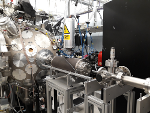| Version 6 (modified by , 6 years ago) ( diff ) |
|---|
Gabor Lens meeting: 14May20; 16:00 BST
Present:
Notes
Summary of actions:
Agenda
- Introduction, notes and actions: KL/All
- JPo: Provide TSD with the geometry of the present prototype Gabor lens
- KL/RB: Take a look at the Bingham et al paper on laser-driven accelerator for medicine
- CW: Introduce Titus to D. Spears and find the ISIS person to contact about access to VSim
- Done.
- CW has talked to DS and KR and feeling is that problem is tractable. Might be able to use the version of VSIM in Strathclyde (version 5). So, this might be a way forward. Possible to use SMILEI to do the plasma simulation too. But, needs to have field maps input. Does not necessarily have the correct boundary conditions. When TSD is ready, get in touch with DSpears with others in CC.
- Done.
- TSD: Advise on machine requirements for our use of VSIM
- Superseded. Plan as outlined above.
- RB: Advise on VSIM contact in ISIS
- Superseded. KL will raise with J.Thomason. Pass action to.
- AK: Circulate relevant documentation on SMILEI so that experts can judge whether the code can be used for instability simulation.
- Done.
- Review of calculation of instability: RB
The diocotron frequency is proportional to the plasma frequency squared divided by the cyclotron frequency which is 90n/B where n is the density (cm-3) and B (Gauss) is the magnetic field. For hollow densities in the transverse direction the growth rate is a geometric factor x the diocotron frequency. The geometric factor is a function of the radius, electrode positions etc. For instability it requires a + slope in the radial density profile. A small slope gives rise to growth rates much smaller than the diocotron frequency.
- Updates on the particle generation: HT
- Updates on the simulation of Gabor lens: TSD
- Discussion of next steps: All
Connection details
Join Zoom Meeting: https://cern.zoom.us/j/94290912699?pwd=WngvZk1oSWpyNldHT05NV3FrYWFaUT09
Note:
See TracWiki
for help on using the wiki.
